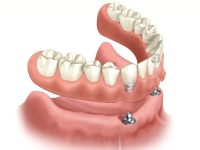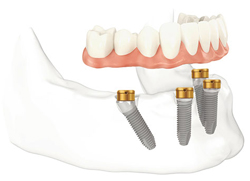Implant overdentures relieve much of the anxiety you might have about wearing dentures. They provide stability, help you smile with confidence, and dramatically improve your ability to chew. Patients often say it feels like they have their own natural teeth back.
What Are Implant Overdentures?
Unlike a traditional denture that rests on your gums, implant overdentures are supported by dental implants that are placed in your jawbone.
How Do They Compare with Traditional Removable Dentures?
Upper denture
It’s shaped like a horseshoe and does not have a palate. It will be much more comfortable. And it will be easier for you to speak and enjoy the taste of food.
Lower denture
It doesn’t rest on your gums and rub or irritate them. The implants will prevent your denture from moving around in your mouth, lifting, or falling out.
Other Advantages
- Stimulates jawbone – Over time your jawbone shrinks when all your teeth are missing. And dentures that rest on your gums accelerate bone shrinkage. Implants stimulate the bone, preventing shrinkage.
- Prevents facial sagging – Your jawbone supports your facial muscles. Implants help preserve the bone and prevent facial collapse, which not only makes you look older prematurely but will eventually make it impossible to comfortably wear any denture at all.
- Ability to eat what you want – Even the best set of removable dentures, made before any facial collapse sets in, reduces your chewing efficiency by 50% and will cause you to have to alter your diet. With the increased stability of implant-supported overdentures, you will have your chewing ability restored and will be able to enjoy eating whatever you want.
- Improved quality of life – Implant overdentures relieve much of the discomfort associated with traditional dentures. And they help you feel less self-conscious about wearing dentures. You can enjoy socializing without worrying about the embarrassing moments loose dentures can cause.
Implant Overdenture Options

Snap-on denture
As few as two implants can stabilize a denture. But four implants or more are recommended for optimum stability.
Snap-on denture
A snap-on denture is held in place with two dental implants near the front of your jawbone, and the denture base snaps onto them.
All-On-4

All-On-4 dental implants
This technique was developed for patients with low jawbone volume. The front two implants are vertical, and the ones behind them are tilted up to 45 degrees. The angle increases contact with the jawbone to improve retention of the prosthesis without the need for bone grafting. Six implants will increase stability even more.
What’s the Process?
Dr. Finley will carefully review your medical and dental histories to determine if you’re a candidate for implant overdentures.
- Cone-beam imaging – We use this technology to produce a 3-D image of your teeth, bone volume, and oral anatomy. It helps Dr. Finley accurately place the implants and avoid mistakes like nerve impingement or perforation of the bone that can result in numbness, tingling, infection, or implant failure.
- Implant placement – A small incision is made to place each implant fixture in your jawbone.
- Healing process – Osseointegration occurs when the implant fixtures and your jawbone fuse. It takes a few months, but you’ll wear a temporary denture during the healing process. And you will leave our office with a new smile.
- Follow-up appointments – You’ll have follow-up appointments to ensure the healing process is going well.
- Permanent teeth – After the healing period, Dr. Finley will place your permanent denture on the implants. He will check your bite and ensure you’re happy with your smile.
How to Care for Implant Overdentures
Snap-on dentures
They are removable, and you will take them out nightly.
- Use a denture brush or an extra-soft toothbrush and non-abrasive denture cleaner. Avoid toothpaste because it’s abrasive and can scratch your denture teeth.
- Thoroughly brush your gums and around the implants.
- A water flosser will rinse away any remaining debris around the implant components.
- Keep your scheduled exam appointments to ensure your gums are healthy and your dentures and implants are in good condition.
Fixed implant-supported dentures
- Brush your denture with an extra-soft toothbrush and non-abrasive denture cleaner. Avoid toothpaste because it can scratch your denture teeth.
- It’s helpful to use a water flosser to flush out debris beneath your denture and around the implant fixtures.
- Keep your scheduled exam appointments to ensure your gums are healthy and your dentures and implants are in good condition.
A Smile that Looks Natural
Dr. Finley is an artistic cosmetic dentist who will design your denture, which will be made by our laboratory partner. You will receive well-supported dentures and a natural-looking smile. If you’re interested in implant overdentures, call us to schedule an appointment for an exam or complete our Request an Appointment form.





